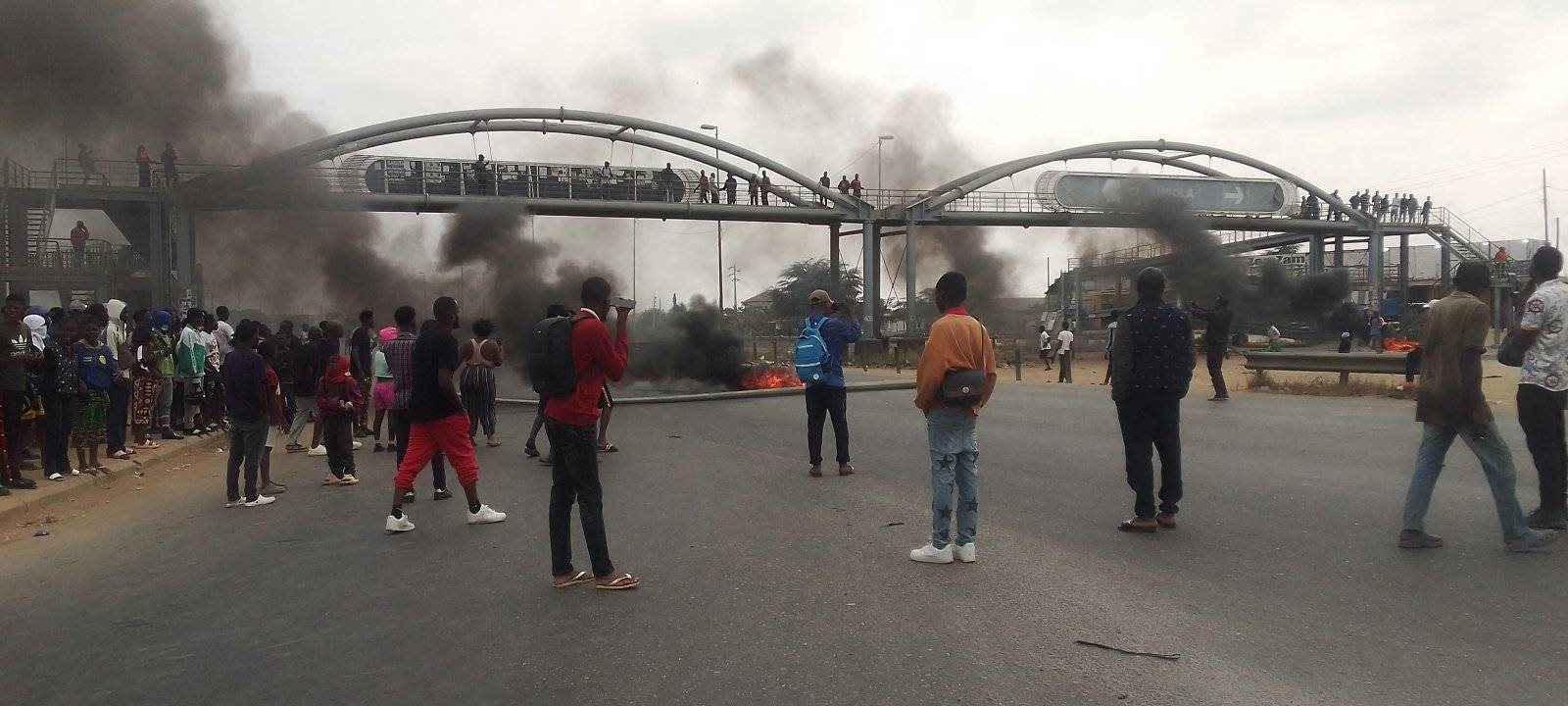Image: Agostinho S K Miguel
By Friends of Angola
Luanda, July 27, 2025 — What began as a peaceful protest against the Angolan government’s recent 47% increase in fuel prices has escalated into a wave of social unrest marked by looting, vandalism, and a forceful security crackdownin several parts of the country. The move to eliminate subsidies on diesel — raising prices from 200 to 300 kwanzas per liter (from €0.19 to €0.28) — has triggered mass frustration among taxi drivers, civil society groups, and a population already strained by a prolonged economic crisis.
The unrest was sparked by a three-day strike organized by the New Alliance of Taxi Drivers Association (ANATA) in Luanda. Protesters not only rejected the fuel hike as unjustified, but also demanded regulated taxi stops and the creation of a professional taxi driver credential, long promised by the authorities but never implemented.
What started as a sectoral grievance quickly evolved into spontaneous demonstrations across Luanda and beyond, with residents in neighborhoods such as Viana, Cazenga, Benfica, and Kilamba taking to the streets to denounce rising costs of living, poor governance, and lack of social protection.
Looting, Violence, and Repression
Eyewitnesses reported incidents of looting in informal markets, attacks on small shops, burning tires, and confrontations with police forces. Security agents deployed across protest zones used tear gas and rubber bullets, and numerous individuals were arrested, including well-known civic activists.
“We’re not just protesting the fuel hike — we’re protesting hunger, unemployment, and being ignored,” said a protester in the Cazenga district.
Human Rights Organizations Raise Alarm
In a strongly worded statement, a coalition of Angolan human rights organizations, including Friends of Angola (FoA), Associação OMUNGA, and AssociaçãoUpangue, FORDU e ALDA condemned the government’s economic measures and warned of their disproportionate impact on the country’s most vulnerable citizens.
“The removal of fuel subsidies, without safeguards for the poor, represents a serious violation of the economic and social rights of millions of Angolans,” the statement read. “These measures are pushing citizens into deeper poverty while state institutions fail to offer effective protection or meaningful dialogue.”
According to the coalition, the price hike exacerbates inequality and disproportionately affects informal workers and low-income families who depend on public and semi-public transport. It also warned that criminalizing public protestwould only deepen the crisis.
The Broader Economic Picture
Economist and journalist Carlos Rosado de Carvalho, in an interview with CNN Portugal, emphasized that the fuel hike is only the latest in a series of burdens placed on citizens:
“Tuition fees have increased — and there is no free public education in Angola. Transport, electricity, and water costs have all risen. This strike only reinforces a broader wave of civil resistance that has been building up for months.”
He noted that protests have occurred on each of the past two Saturdays, organized by civic groups independent of the political opposition. “It’s likely these protests will continue,” he said.
Angolans have taken to social media to denounce the paradox of rising fuel prices in a country that is Africa’s third-largest oil producer, and one of the top 20 oil producers in the world. Despite this, basic services remain underdeveloped, and public revenues are widely seen as mismanaged or siphoned off by corruption.
Government Response
The Angolan government has defended the reform as essential for fiscal discipline and economic modernization, part of a long-term strategy to reduce dependence on oil revenues and subsidies. The Ministry of Interior, however, issued warnings against “acts of vandalism and sabotage,” pledging to restore order.
At the same time, critics argue that reforms have been implemented with little transparency or social cushioning — no public transport alternatives, no compensation programs for the poor, and no space for meaningful participation in decision-making.
What Comes Next
With civil society movements planning more protests in the coming days, Angola faces a defining moment. The choice is between continued repression and exclusion, or dialogue and accountability.
“This is not just about fuel. It’s about social injustice and a broken social contract,” said a spokesperson from the Southern Africa Human Rights Defenders Network.
For now, Luanda remains under heavy surveillance, but the voices calling for change are growing louder. The government’s response — whether conciliatory or repressive — may determine whether this crisis marks a turning point or a deeper descent into instability.

